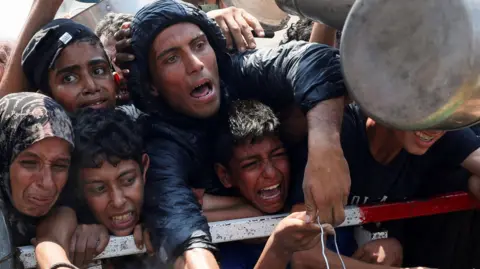Gaza Aid: Israel Starts Airdrops
Gaza's Hunger Crisis: A Race Against Time
**Did you know that over 59,000 people have died in Gaza since October 7th, 2023, many from starvation?** This isn't a natural disaster; it's a man-made catastrophe unfolding before our eyes. And you can help understand the urgency of this situation.
A Tiny Airdrop, A Mountain of Need?
Israel's military recently announced a humanitarian airdrop to Gaza, a seemingly small gesture against the backdrop of a devastating hunger crisis. Seven packages of flour, sugar, and canned food—a paltry amount for two million starving people. The IDF claims this was coordinated with international organizations and led by COGAT, the body overseeing aid entry. But a video released by the IDF, showing the drop, lacks independent verification—raising immediate questions about transparency. Palestinian officials remain silent.
This airdrop followed weeks of intense international pressure. The UN, aid groups, and even some of Israel's allies have condemned the severe food shortages, directly blaming Israel for the crisis. The WHO chief, Tedros Adhanom Ghebreyesus, didn't mince words: he called it "man-made mass starvation." But is this airdrop a genuine attempt at aid or simply a PR stunt?
The Siege Tightens: A Desperate Struggle for Survival
 The situation is dire. Israel cut off supplies to Gaza starting in March, re-imposing stringent restrictions in May, leading to widespread starvation and dehydration. Palestinians face almost daily peril seeking even meager aid. Witnesses recount horrific stories of Israeli forces shooting civilians near aid distribution points, while Israel claims its troops only fire warning shots. The death toll, disputed on both sides, includes shockingly high numbers of children. One desperate mother told the BBC, "We live with no food, no drink, not even water."
This crisis started long before the October 7th attack. While Israel backed the Gaza Humanitarian Foundation (GHF), allowing it to operate, reports of deaths among civilians seeking aid have been almost daily since late May. The GHF's presence, while seemingly helpful, hasn't been enough to alleviate the hunger crisis.
The UN's Plea: A Siege of Silence?
The UN's refugee agency, UNRWA, has thousands of trucks ready to deliver aid from neighboring countries—but they remain blocked. UNRWA head Philippe Lazzarini declared airdrops "expensive, inefficient, and potentially deadly," urging Israel to "lift the siege, open the gates, and guarantee safe passage." He and other aid agencies believe this is the only true solution. Gazans share this concern. One resident told BBC Arabic that similar airdrops in the past ended in "tragedy," causing serious injuries and deaths when aid landed on homes.
The IDF counters that the UN and other aid organizations are responsible for food distribution, asserting that aid must not reach Hamas. But is this a reasonable expectation amidst a humanitarian catastrophe?
What Happens Next? A Critical Crossroads
The situation is dire. Israel cut off supplies to Gaza starting in March, re-imposing stringent restrictions in May, leading to widespread starvation and dehydration. Palestinians face almost daily peril seeking even meager aid. Witnesses recount horrific stories of Israeli forces shooting civilians near aid distribution points, while Israel claims its troops only fire warning shots. The death toll, disputed on both sides, includes shockingly high numbers of children. One desperate mother told the BBC, "We live with no food, no drink, not even water."
This crisis started long before the October 7th attack. While Israel backed the Gaza Humanitarian Foundation (GHF), allowing it to operate, reports of deaths among civilians seeking aid have been almost daily since late May. The GHF's presence, while seemingly helpful, hasn't been enough to alleviate the hunger crisis.
The UN's Plea: A Siege of Silence?
The UN's refugee agency, UNRWA, has thousands of trucks ready to deliver aid from neighboring countries—but they remain blocked. UNRWA head Philippe Lazzarini declared airdrops "expensive, inefficient, and potentially deadly," urging Israel to "lift the siege, open the gates, and guarantee safe passage." He and other aid agencies believe this is the only true solution. Gazans share this concern. One resident told BBC Arabic that similar airdrops in the past ended in "tragedy," causing serious injuries and deaths when aid landed on homes.
The IDF counters that the UN and other aid organizations are responsible for food distribution, asserting that aid must not reach Hamas. But is this a reasonable expectation amidst a humanitarian catastrophe?
What Happens Next? A Critical Crossroads
 This is not just a conflict; it's a humanitarian emergency. The crisis continues to escalate. Israel's apparent concessions, such as restoring power to a desalination plant serving 900,000, and its acceptance of a Jordanian, UAE, and UK-backed plan for airdrops, are, as aid agencies point out, insufficient. The real question is: will Israel truly address the root cause—the blockade—before more lives are lost? The world watches, anxiously awaiting the next chapter in this tragic unfolding story. Will the humanitarian crisis in Gaza reach a point of no return? The clock is ticking.
This is not just a conflict; it's a humanitarian emergency. The crisis continues to escalate. Israel's apparent concessions, such as restoring power to a desalination plant serving 900,000, and its acceptance of a Jordanian, UAE, and UK-backed plan for airdrops, are, as aid agencies point out, insufficient. The real question is: will Israel truly address the root cause—the blockade—before more lives are lost? The world watches, anxiously awaiting the next chapter in this tragic unfolding story. Will the humanitarian crisis in Gaza reach a point of no return? The clock is ticking.

Image 1

Image 2
Comments
Post a Comment